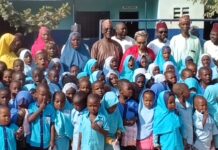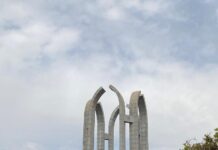Brief history of SBS of ABU Zaria
In 1961, the Premier of the Northern Region of Nigeria, Sir Ahmadu Bello (Sardaunan Sokoto) invited Prof Norman Alexander to establish a befitting university for the Northern Region.
The New Zealander became the pioneer Vice Chancellor of the institution. (Alexander Hall, one of the students’ halls of residence, is named after him). The university, named after the Premier took off in 1962, and the first set of students graduated in 1965.
From that time on, the only qualification for admission to a degree program in a few Nigerian universities, including ABU, was the Higher School Certificate (HSC), a recognized diploma, and other duly accredited certificate courses. The university authorities felt the North would be lagging if a faster means of qualifying for a degree program was not created.
In 1970, the institution under Prof Ishaya Audu, the successor of Alexander and the first indigenous Vice Chancellor, came up with an idea to establish a tertiary institution to prepare fresh secondary school graduates for university education.
The School of Basic Studies was therefore established in 1970 to start a 2-year training in Arts and Science subjects for fresh secondary school leavers. The students would be admitted on the strength of a minimum of 5 credits in the MOCK/WASC exam, having sat for the WAEC exams in June and awaiting the release of the result. They would start the course in what was known as “the summer term”, ie from July to August. The students would then proceed on holiday.
By September, the WAEC results would have been released and the MOCK/WASC results would cease to function. Only those who passed WAEC with a minimum of 5 credits would resume studies at the SBS/ABU as full-time students. For those students who failed WAEC, the only taste of SBS they would know would be that summer term experience.
As full lectures would resume in September for those successful students, they would be allowed all the privileges of their seniors, ie the degree students, even though they had not matriculated. Ribadu and Alexander Halls were mostly reserved for male students, 3 to a room, each with a bed, reading table, and wardrobe. The girls shared Amina Hall with other degree and post-degree female students.
The SBS students enjoyed university life without segregation. Together with the degree, post-degree, diploma, and other certificate course students, they shared the same lecture theatres, dining halls, laundry services, subsidized university bookshops, libraries, and weekend entertainment such as campus parties, film shows, etc.
Many of the students were little boys and girls, some as young as 16 years old, just out from boarding secondary schools, now finding themselves in the free university environment where “seniority” was unknown, where there were no “lights out”, where punishment for skipping lessons was unknown. Some boys were so timid that they would change lanes if they came close to a female student because they had never mingled with girls in school.
As for the girls, they would always move in groups because they felt it was harder for a boy to accost a girl in the company of her female colleagues. Such a group was tagged “Jam’iyyar Matan Arewa” (Northern Women Association) by mischievous fellows.
READ ALSO: The true history of Ilorin
Another challenge the little kids among the SBS students faced was managing the “huge” amounts of money at their disposal in form of scholarship allowances, depending on which state one came from. Many of them never handled such amounts before. Apart from individual classes in the SBS, large-audience lectures such as Sociology, Political Science, Contemporary History, etc, were held at the twin Wolfson & Kainji Theatres of the Engineering Faculty and FASS Theatre. Students had to walk very briskly from the school to those theatres to secure prime seating.
One of the longest-serving SBS Principals was one Mr. J S Angulu, who led it up to the mid-70s and beyond, with a very old Briton, Dr. J M Beale who proudly taught the Use of English, along with an elegant Miss Dikko, a Wusasa lady who taught Chemistry, Dr. Femi Odekunle who taught Criminology, a tiny Irish lady, Miss E Dagg who taught English Literature, etc.
After about 2 trials of the 2-year course, the university authorities reduced the period to only one year. A lot was compacted in that one year that students thought chances of passing the final exams were very slim. Some students opted to attend Colleges of Arts & Science, Polytechnics, Schools of Remedial Studies, etc for their tertiary education. However, the quality of training at the SBS remained at the top.
With the creation of a separate and independent School of Basic & Remedial Studies, Funtua by some Northern states, the university finally drew the curtain on the SBS/ABU experiment that lasted for 20 years (1970-1990) after a very successful outing.
Source: Unknown
Follow the Neptune Prime channel on WhatsApp:
Do you have breaking news, interview request, opinion, suggestion, or want your event covered? Email us at neptuneprime2233@gmail.com





